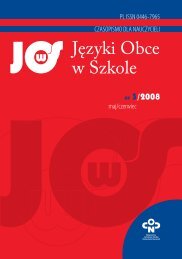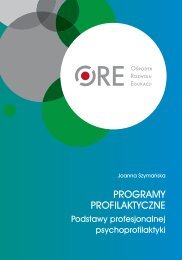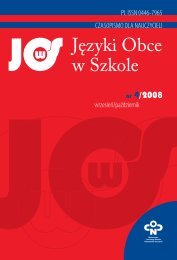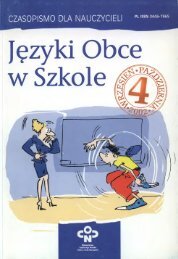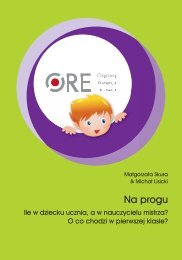JÄzyki Obce w Szkole - Biblioteka Cyfrowa OÅrodka Rozwoju Edukacji
JÄzyki Obce w Szkole - Biblioteka Cyfrowa OÅrodka Rozwoju Edukacji
JÄzyki Obce w Szkole - Biblioteka Cyfrowa OÅrodka Rozwoju Edukacji
You also want an ePaper? Increase the reach of your titles
YUMPU automatically turns print PDFs into web optimized ePapers that Google loves.
Języki <strong>Obce</strong> W <strong>Szkole</strong> n r 5/2008 l i s t o p a d/g r u d z i e ń<br />
Across:<br />
1.<br />
4.<br />
5.<br />
7.<br />
8.<br />
Ćwiczenie 7 – Praca w parach<br />
Wybierz pięć przymiotników z ćwiczenia 2 i z każdym<br />
z nich ułóż pytanie, które zadasz swojemu<br />
partnerowi (zaczynające się od „Do you often.../<br />
Have you ever...), żeby się dowiedzieć, jakie potrawy<br />
on/ona lubi i co o nich sądzi. Zanotuj odpowiedzi<br />
partnera.<br />
Przykładowe pytania:<br />
1. Do you prefer mild or spicy dishes?<br />
2. Do you often eat junk food?<br />
3. Have you ever eaten raw fish?<br />
4. Do you think fatty food is unhealthy?<br />
5. Do you agree that sweet food is bad for your<br />
teeth?<br />
Ćwiczenie 8 – Praca w parach<br />
Na podstawie informacji o swoim partnerze, zebranych<br />
w ćwiczeniu 3, napisz pięć zdań o jego/jej preferencjach<br />
żywieniowych.<br />
Przykładowe zdania:<br />
1. Marysia prefers hot spicy dishes. She doesn’t<br />
like mild ones. She loves Mexican cuisine.<br />
2. She sometimes goes to fast food restaurants<br />
although she knows that the food there is<br />
rath er unhealthy.<br />
3. She has never eaten raw fish but she would<br />
like to have a taste of it.<br />
4. She believes that fatty food is unhealthy and<br />
she thinks we should cut on it.<br />
5. She agrees that eating too much sweets is not<br />
good for our teeth.<br />
Ćwiczenie 9 – Praca w parach<br />
Uczeń A uzupełnia tekst o Mary, a uczeń B o Ann,<br />
wybierając poprawną formę czasownika. Następnie<br />
każdy z nich układa 5 pytań, których celem jest odkrycie,<br />
o kim jest tekst partnera. Pytania muszą być<br />
tak skonstruowane, żeby partner mógł odpowiedzieć<br />
tylko TAK lub NIE. Uzyskawszy informacje,<br />
każdy uczeń pisze tekst na temat bohatera swojego<br />
partnera. Na koniec uczniowie w parach porównują<br />
swoje teksty z oryginałami.<br />
Handout A<br />
Let’s have a closer look at Mary who 1. is/is being<br />
a representative of American teenagers. She<br />
2. is/has sixteen years old. She 3. lives/is living<br />
in a small town and where she 4. is attending/<br />
attends High School. She 5. isn’t looking/doesn’t<br />
look like a model but this is what she 6. dreams/<br />
is dreaming of. Now she 7. wants/is wanting to<br />
lose weight. At the moment Mary 8. is/is being<br />
in the gym. She 9. is doing/does aerobics. She<br />
10. thinks/is thinking this is the best way to keep<br />
fit and stay in shape.<br />
Handout B<br />
Let me introduce Andrew, a seventeen-year-old<br />
high school student who 1. comes/is coming<br />
from a small village. Now he 2. lives/is living in<br />
a student’s house with other schoolmates in a big<br />
city. Nearly every weekend he 3. visits/is visiting<br />
his parents who 4. live/are living on a farm.<br />
On Mondays and Wednesdays afternoons he 5. is<br />
working/works in a fast food restaurant. Right<br />
now he 6. is serving/serves a customer. A young<br />
woman with two children who 7. are behaving/<br />
behave very loudly. Other people who 8. wait/<br />
are waiting in the queue 9. seem/are seeming<br />
to be quite irritated. Although it isn’t a well-paid<br />
job, Andrew 10. doesn’t think/ isn’t thinking of<br />
looking for another one right now.<br />
Przykładowe pytania:<br />
1. Is your text about a boy/a girl?<br />
2. Is he/she a teenager?<br />
3. Does he/she come from a big city?<br />
4. Does he/she go to school?<br />
5. Does he/she work?<br />
6. Does she/he do anything to keep fit?<br />
Ćwiczenie 10. Uporządkuj wyrazy, tak by powstały<br />
poprawne zdania pytające.<br />
1. aren’t/ sitting/ why/ in/ place/ you/ your?<br />
2. languages/ his/ speak/ how/ father/ many/<br />
does?<br />
3. Martin/ does/ usually/ how/ work/ get/ to?<br />
4. about/ they/ talking/ are/ leaving/ their/ exam/<br />
school?<br />
5. he/ curly/ got/ has/ short/ hair?<br />
6. anybody/ listenig/ there/ who/ to/ isn’t/ me/<br />
is?<br />
7. these/ from/ flowers/ who/ are?<br />
166



